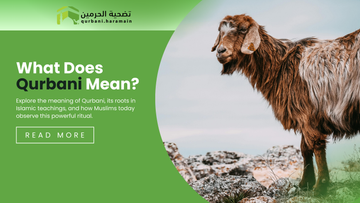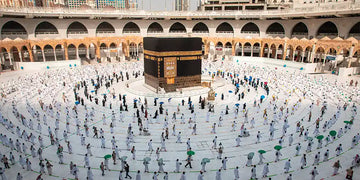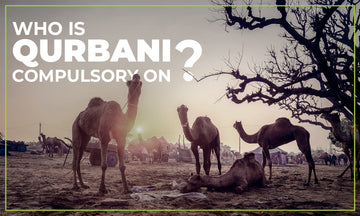Qurbani, also known as Udhiya, is one of the most beautiful traditions in Islam, performed during Eid al-Adha. It commemorates the ultimate act of obedience by the Prophet Ibrahim (AS), who was ready to sacrifice his son Ismail (AS) purely for the sake of Allah. This powerful story reminds us that true faith requires complete trust and submission. But many Muslims often ask: Is Qurbani Fard (obligatory) or Sunnah (highly recommended)? Let’s explore this question, and also look at other types of Qurbani in Islam.
What is Qurbani?
Qurbani is the ritual sacrifice of an animal (such as a goat, sheep, cow, or camel) during Eid al-Adha. It’s an act of worship that reflects:
-
Obedience to Allah: Following the example of the Prophet Ibrahim (AS).
-
Gratitude: Recognizing and appreciating Allah’s blessings.
-
Charity: Sharing meat with family, neighbors, and the poor.
Qurbani is much more than a ritual. It’s a reminder of devotion, humility, and generosity. The Prophet Muhammad (SAW) said, “There is nothing dearer to Allah during the days of sacrifice than the sacrificing of animals.” (Tirmidhi)
Is Qurbani Fard or Sunnah?
This is one of the most common questions asked by Muslims during Eid season. Scholars have different opinions:
Qurbani as Fard
Some scholars, particularly from the Hanafi school of thought, consider Qurbani as Wajib (close to Fard) for those who:
- Are Muslim adults.
- Are financially capable (possess the nisab amount of wealth).
- Are not traveling during Eid.
They argue that neglecting Qurbani without a valid reason is sinful because it’s strongly emphasized in authentic Hadiths.
Qurbani as Sunnah Mu’akkadah
The Maliki, Shafi’i, and Hanbali schools consider Qurbani to be a Sunnah Mu’akkadah, a highly emphasized Sunnah. This means it’s not strictly obligatory, but it is strongly recommended and should not be neglected by those who can afford it.
Takeaway: Whether you follow the opinion that it’s Fard/Wajib or Sunnah Mu’akkadah, Qurbani holds immense spiritual reward and should be prioritized.
|
Term |
Definition |
Qurbani’s Status |
|
Fard |
A compulsory act; missing it is sinful. |
Hanafi: Close to Fard (Wajib) |
|
Sunnah |
A recommended act; highly rewarded if done. |
Shafi’i, Maliki, Hanbali: Sunnah Mu’akkadah |
Regardless of the ruling, performing Qurbani shows your devotion and earns immense rewards.
Practical Examples
-
If you have financial stability: Perform Qurbani to show gratitude and fulfill your duty.
-
If you’re struggling financially: There’s no sin in skipping it; intention matters most.
-
Living abroad or traveling: If performing Qurbani isn’t feasible, you can donate money to trusted charities who’ll sacrifice on your behalf.
Common Misconceptions
-
“I can skip Qurbani and donate money instead.” While giving charity is commendable, Qurbani is a separate act of worship and should not be replaced by donations unless there’s a genuine reason.
-
“Only men are responsible for Qurbani.” Any adult Muslim who meets the wealth criteria should perform Qurbani, regardless of gender.
-
“I have to sacrifice it myself.” No, you can appoint someone or use a trusted organization to carry it out for you.
Types of Qurbani in Islam
While the Eid al-Adha sacrifice is the most well-known, Islam recognizes several other forms of sacrificial slaughter. Let’s explore them:
1. Eid al-Adha Qurbani (Udhiya)
This is the annual sacrifice done during the days of Eid al-Adha. The meat is distributed in three parts: one-third for the family, one-third for relatives/friends, and one-third for the poor.
2. Sadaqah Zabiha (Voluntary Sacrifice)
Sadaqah Zabiha is a voluntary act of charity where an animal is sacrificed at any time of the year (outside of Eid al-Adha) to seek Allah’s pleasure, protection from harm, or relief from calamities.
Example: A family may offer Sadaqah Zabiha as a way to thank Allah for a blessing like a new job, a safe journey, or good health. The meat is then distributed to the needy.
3. Hajj Zabiha (Hady)
For those performing Hajj, offering a sacrifice is part of the pilgrimage rituals, especially for those doing Hajj Tamattu’ or Qiran. The sacrifice is offered in Mina after the rites of Hajj, symbolizing submission and gratitude.
Note: The meat is often distributed locally to pilgrims and the poor in Makkah.
4. Dam Zabiha (Compensatory Sacrifice)
“Dam” means blood, and Dam Zabiha is a compensatory sacrifice offered when a pilgrim performing Hajj or Umrah violates certain rules. For example:
-
Failing to wear Ihram properly.
-
Missing a Wajib act of Hajj.
-
Shaving the head at the wrong time.
This sacrifice makes up for the mistake and is distributed to those in need.
|
Type of Sacrifice |
When It’s Done |
Purpose |
Ruling |
|
Eid al-Adha Qurbani (Udhiya) |
During Eid al-Adha (10th-12th Dhul Hijjah) |
Sunnah of the Prophet Ibrahim (AS), worship, charity |
Sunnah Mu’akkadah / Wajib (Hanafi) |
|
Sadaqah Zabiha |
Anytime of the year |
Charity, protection, fulfilling vows |
Voluntary |
|
Hajj Zabiha (Hady) |
During Hajj |
Required for certain types of Hajj |
Fard for Tamattu’ or Qiran |
|
Dam Zabiha |
During Hajj/Umrah |
Compensation for mistakes |
Obligatory (as penalty) |
Practical Tips for Performing Qurbani
-
Choose a Healthy Animal: Islam emphasizes kindness to animals; choose one free of defects.
-
Understand Timing: Eid al-Adha Qurbani can only be performed after Eid prayer and during the three days of Tashreeq (10th to 12th Dhul Hijjah).
-
Intention Matters: Make the Niyyah (intention) before sacrificing.
-
Share the Blessings: Divide the meat and share generously with neighbors, family, and the poor.
Why Qurbani Matters Spiritually
Performing Qurbani isn’t just about following tradition, it’s a reminder of what true submission looks like. The Prophet Ibrahim’s willingness to sacrifice his son shows us the depth of faith and obedience that we should strive for. Every act of sacrifice draws us closer to Allah and strengthens the bonds of our community.
When you perform Qurbani, you’re:
-
Honoring the Sunnah of the Prophet Ibrahim (AS) and the Prophet Muhammad (SAW).
-
Helping the poor by providing them with fresh meat.
-
Purifying your wealth and demonstrating gratitude to Allah.
Summary
In summary, Qurbani holds profound spiritual and communal importance whether viewed as Fard or Sunnah, it embodies obedience, compassion, and faith in Allah’s commands. By exploring other forms like Sadaqah Zabiha, Hajj Zabiha, and Dam Zabiha, it's evident just how rich and varied this worship can be across different contexts.
If you're looking for a trustworthy, convenient way to fulfill any of your Qurbani obligations, let Qurbani Haramain help you perform your Qurbani in Makkah with full sincerity and integrity. Visit Qurbani Haramain today and make your worship count, no matter where you are.




